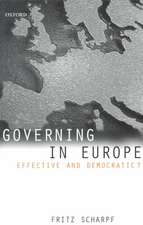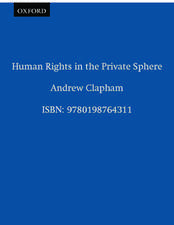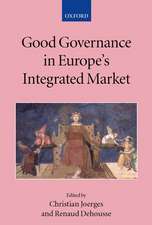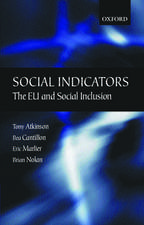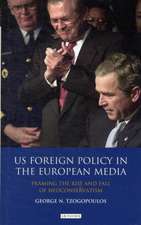Comparative Regional Integration: Theoretical Perspectives: Routledge Revivals
Autor Finn Laursenen Limba Engleză Paperback – 11 noi 2019
| Toate formatele și edițiile | Preț | Express |
|---|---|---|
| Paperback (1) | 181.43 lei 6-8 săpt. | |
| Taylor & Francis – 11 noi 2019 | 181.43 lei 6-8 săpt. | |
| Hardback (2) | 627.49 lei 6-8 săpt. | |
| Taylor & Francis – 22 noi 2017 | 627.49 lei 6-8 săpt. | |
| Taylor & Francis – 28 apr 2010 | 769.37 lei 6-8 săpt. |
Din seria Routledge Revivals
- 9%
 Preț: 801.69 lei
Preț: 801.69 lei - 8%
 Preț: 432.15 lei
Preț: 432.15 lei -
 Preț: 153.81 lei
Preț: 153.81 lei -
 Preț: 230.80 lei
Preț: 230.80 lei -
 Preț: 294.72 lei
Preț: 294.72 lei -
 Preț: 258.72 lei
Preț: 258.72 lei - 9%
 Preț: 764.34 lei
Preț: 764.34 lei - 9%
 Preț: 903.41 lei
Preț: 903.41 lei -
 Preț: 296.10 lei
Preț: 296.10 lei -
 Preț: 342.36 lei
Preț: 342.36 lei - 9%
 Preț: 606.35 lei
Preț: 606.35 lei -
 Preț: 317.54 lei
Preț: 317.54 lei - 9%
 Preț: 764.28 lei
Preț: 764.28 lei -
 Preț: 257.00 lei
Preț: 257.00 lei -
 Preț: 238.40 lei
Preț: 238.40 lei -
 Preț: 259.47 lei
Preț: 259.47 lei - 9%
 Preț: 903.80 lei
Preț: 903.80 lei -
 Preț: 326.26 lei
Preț: 326.26 lei -
 Preț: 258.66 lei
Preț: 258.66 lei -
 Preț: 294.97 lei
Preț: 294.97 lei -
 Preț: 308.89 lei
Preț: 308.89 lei -
 Preț: 199.85 lei
Preț: 199.85 lei -
 Preț: 347.49 lei
Preț: 347.49 lei -
 Preț: 295.04 lei
Preț: 295.04 lei -
 Preț: 389.39 lei
Preț: 389.39 lei -
 Preț: 257.00 lei
Preț: 257.00 lei -
 Preț: 343.21 lei
Preț: 343.21 lei - 9%
 Preț: 640.90 lei
Preț: 640.90 lei - 9%
 Preț: 619.48 lei
Preț: 619.48 lei -
 Preț: 228.88 lei
Preț: 228.88 lei -
 Preț: 257.67 lei
Preț: 257.67 lei -
 Preț: 245.10 lei
Preț: 245.10 lei -
 Preț: 258.52 lei
Preț: 258.52 lei -
 Preț: 258.72 lei
Preț: 258.72 lei -
 Preț: 368.93 lei
Preț: 368.93 lei -
 Preț: 246.37 lei
Preț: 246.37 lei - 9%
 Preț: 832.07 lei
Preț: 832.07 lei -
 Preț: 258.66 lei
Preț: 258.66 lei -
 Preț: 286.98 lei
Preț: 286.98 lei - 18%
 Preț: 695.85 lei
Preț: 695.85 lei - 9%
 Preț: 934.94 lei
Preț: 934.94 lei - 5%
 Preț: 231.22 lei
Preț: 231.22 lei -
 Preț: 267.15 lei
Preț: 267.15 lei -
 Preț: 200.66 lei
Preț: 200.66 lei - 9%
 Preț: 638.61 lei
Preț: 638.61 lei -
 Preț: 259.68 lei
Preț: 259.68 lei - 9%
 Preț: 1038.45 lei
Preț: 1038.45 lei -
 Preț: 389.43 lei
Preț: 389.43 lei -
 Preț: 302.13 lei
Preț: 302.13 lei -
 Preț: 294.72 lei
Preț: 294.72 lei
Preț: 181.43 lei
Preț vechi: 217.17 lei
-16% Nou
Puncte Express: 272
Preț estimativ în valută:
34.72€ • 36.25$ • 28.73£
34.72€ • 36.25$ • 28.73£
Carte tipărită la comandă
Livrare economică 04-18 aprilie
Preluare comenzi: 021 569.72.76
Specificații
ISBN-13: 9781138716223
ISBN-10: 1138716227
Pagini: 320
Greutate: 0.59 kg
Ediția:1
Editura: Taylor & Francis
Colecția Routledge
Seria Routledge Revivals
Locul publicării:Oxford, United Kingdom
ISBN-10: 1138716227
Pagini: 320
Greutate: 0.59 kg
Ediția:1
Editura: Taylor & Francis
Colecția Routledge
Seria Routledge Revivals
Locul publicării:Oxford, United Kingdom
Descriere
This title was first published in 2003. After briefly reviewing the basic theoretical stances animating the rest of the proceedings, Laursen (international politics, U. of Southern Denmark) presents 11 contributions that comparatively review processes of regional integration around the world.
Cuprins
Contents: Part 1: Introduction: Theoretical perspectives on comparative regional integration, Finn Laursen. Part 2: Governmentalist Perspectives: Rebuilding the Central American bloc in the 1990s: an intergovernmentalist approach to integration, Rafael Sánchez; Presidentialism and Mercosur: a hidden cause for a successful experience, Andrés Malamud; A supply-side theory of international economic institutions for the Mercosur, José Raúl Perales. Part 3: Power Perspectives: Power and regionalism: explaining regional cooperation in the Persian Gulf, Scott Cooper and Brock Taylor; Two funerals and a wedding? The ups and downs of regionalism in East Asia and Asia Pacific after the Asian Crisis, Douglas Webber. Part 4: Constructivist Perspectives: Rethinking the Mediterranean: reality and re-presentation in the creation of a 'Region', Michelle Pace; Two sides of the same coin: mutual perceptions and security community in the case of Argentina and Brazil, Andrea Oelsner; Integration in times of instability: exchange rate and monetary cooperation in Mercosur and the EU, Susana Borrás and Michael Kluth. Part 5: Neofunctionalist and Historical Institutionalist Perspectives: The ECOWAS: from regional economic organization to regional peacekeeper, Peter M. Dennis and M. Leann Brown; Path dependence and external shocks: the dynamics of the EU enlargement eastwards, Svetlozar A. Andreev. Part 6: Concluding Comments: The vertical and horizontal dimensions of regional integration: a concluding note, Walter Mattli; International regimes or would-be polities? Some concluding questions and remarks, Finn Laursen
Recenzii
'This volume provides valuable analysis of important ongoing regional projects, how they compare with the European Union, and the approaches which attempt to explain variation across such projects. The reader will gain a welcome overview of the broad field of comparative regionalism as well as a deeper understanding of key regional integration schemes.' Alberta Sbragia, University of Pittsburgh, USA 'This remarkable work does not only consider the relevance of the European experience for regional integration elsewhere but also draws upon examples from the other regions to illuminate the development of the EU from different theoretical perspectives. A Great Leap Forward in the emerging field of comparative regionalism!' Björn Hettne, University of Gothenburg, Sweden '... regional integration is a complex process. It may involve some or all of the economic, political, legal and security aspects. It may also be pursued under the different structure of domestic politics and international relations. These complexities make it difficult to conduct fruitful studies in comparative regionalism, and they also make it important to appreciate the unique experiences of European integration in a comparative framework. The book has made an important contribution in this regard.' Political Studies Review





